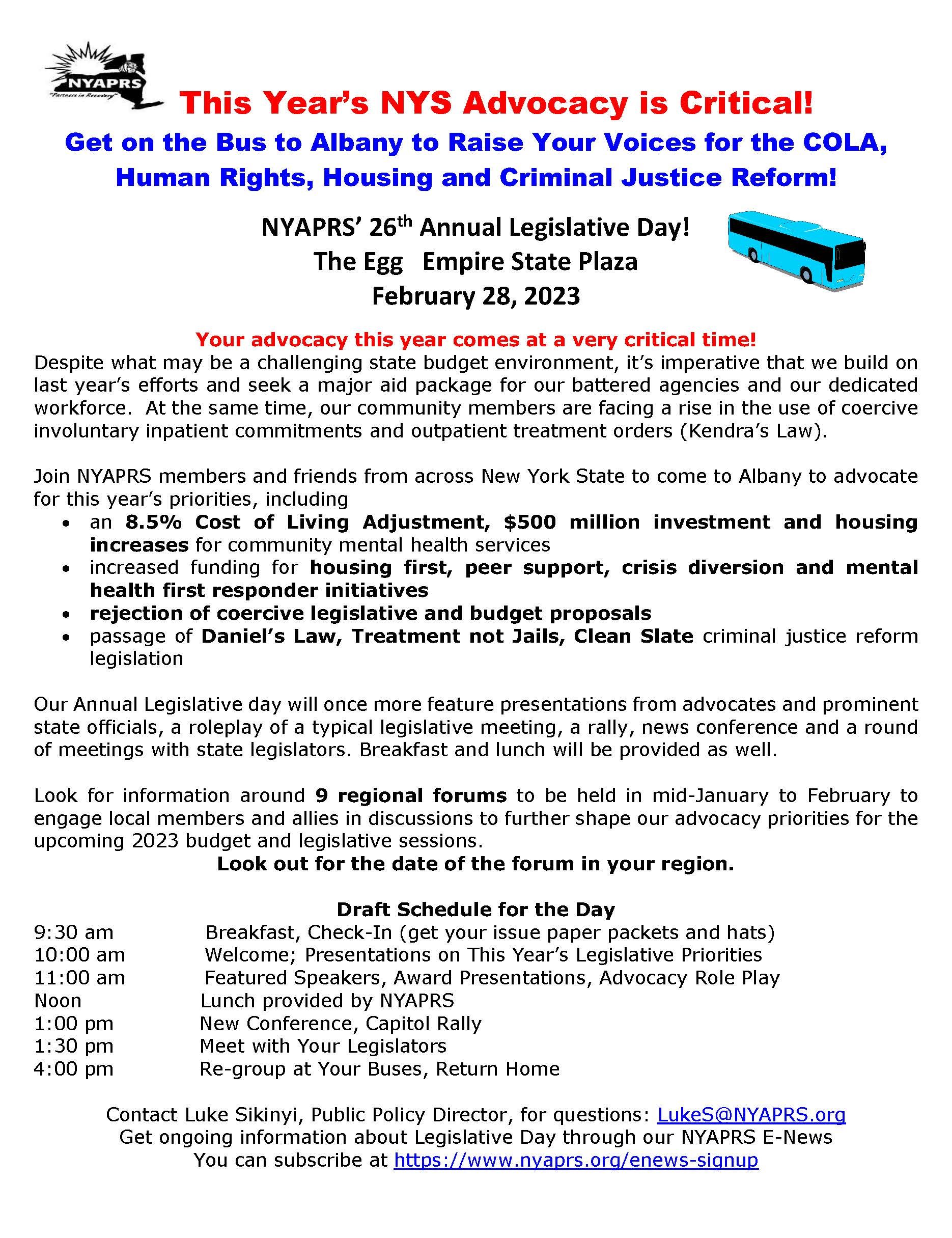NYAPRS Note: Yesterday’s NYAPRS Western NY Regional Forum in Buffalo highlighted a number of items in Governor Hochul’s mental health budget proposal and underscored critically needed local and statewide reforms, especially in terms of improving local crisis responses and hospital discharge plans and advancing the role of peer run services and programs across surrounding counties. Forum attendees heard from Recovery Options CEO and NYAPRS board member Shannon Higbee about a new center that will open in April and offer a short-term crisis respite, an intensive crisis respite, a renewal center in collaboration with Western New York Independent Living and a mental health urgent care associated with Spectrum Health & Human Services. The forum featured comments and recommendations from an expert panel of local stakeholders and included a focus on supporting local advocates to attend NYAPRS February 28 Annual Albany Legislative Day. See more below.
At Regional Mental Health Forum, Erie County Official Notes ‘There’s Much Work to Do to Improve Our Crisis System’
By Jon Harris Buffalo News February 9, 2023
Speaking at a regional forum Thursday, Erie County’s top mental health official assured the more than 50 people attending that their voices are being heard and are helping to supply the pressure needed to improve Western New York’s crisis system.
And one topic came up repeatedly during the nearly three-hour forum: Erie County Medical Center’s Comprehensive Psychiatric Emergency Program, a 24/7 service known as CPEP that serves as the largest safety-net mental health emergency department in the Buffalo Niagara region.
Mark O’Brien, commissioner of the county’s Department of Mental Health, said “there have been complaints about CPEP going back literally decades,” noting that recent news stories have put a fresh spotlight on the issue. Further, he noted, there were some unannounced visits to CPEP in the fall by the state Office of Mental Health after complaints about the program were raised. The county has met with hospital leadership and is working on solutions, he said.
“That work is ongoing and ECMC has been very cooperative in this effort,” he told The Buffalo News after the forum. “They realize that there are issues there. There are some things that are maybe within their control, and there are some things that they’ll probably need some external assistance with, but we’re trying to make it a problem-solving process.”
The forum, held in the Buffalo & Erie County Public Library, was a wide-ranging discussion that covered much more than CPEP, with attendees peppering panelists, including O’Brien, with questions and painting a picture of an overburdened and broken mental health system often lacking the empathy and peer supports needed to help people.
The New York Association of Psychiatric Rehabilitation Services, which is a statewide coalition of people who use and/or provide recovery-oriented community-based mental health services, hosted the forum, a precursor to the group’s annual legislative day in Albany on Feb. 28. As such, the association laid out its thoughts on Gov. Kathy Hochul’s budget proposal, which includes a $1 billion plan to fix the state’s continuum of mental health care.
“There are a lot of good things in this budget,” said Luke Sikinyi, the association’s public policy director. “We are very happy that governor is putting so much emphasis on mental health. I think no governor before her has put this much effort and thought into improving the system, and we are really looking forward to working with her and the Legislature to improve some of the aspects.”
Among the association’s priorities: an 8.5% cost-of-living adjustment for community mental health services providers, which would help recruit and retain workers. Further, the association wants to see more funding for peer support, crisis diversion and mental health first-responder initiatives.
“We’re not going to change the system through the use of hospitals,” said Harvey Rosenthal, the association CEO. “If hospitals were so good, people wouldn’t keep going back to them as much as they do.”
Rosenthal noted much of the reasons those facilities fail is because of poor discharge plans, with the association advocating for more peer support services to help people navigate what can be a complicated system.
And that was a major theme of the forum: Many attendees spoke about the need for more awareness of community services, including peer-support alternatives to coercive treatment and hospitalization. And that need for more awareness, they noted, also extends to the first-responders who are often there on the scene of a crisis.
“There’s much work to do to improve our crisis system,” O’Brien said.
O’Brien noted that there are a lot of new crisis services coming online this year.
For instance, he mentioned that BestSelf Behavioral Health is developing an intensive crisis stabilization center at its 430 Niagara St. location in Buffalo, a facility that could open by the end of the year and would give residents a 24/7 – and voluntary – option to receive evaluation, care, treatment and, if needed, medication.
Coming even sooner: Recovery Options Made Easy’s Kirsten Vincent Respite & Recovery Center, a first-of-its-kind respite and recovery model designed to support crisis stabilization and continued recovery.
The center, which will open in April at 111 Maple St. in Buffalo’s Fruit Belt, will offer a short-term crisis respite, an intensive crisis respite, a renewal center in collaboration with Western New York Independent Living and a mental health urgent care associated with Spectrum Health & Human Services.
“We’re really excited to be able to offer four different levels of service within one location, eliminating the need to transport individuals across the city in times of crisis and to reduce trauma in that way, and also to provide the opportunity to move between levels of service,” Recovery Options CEO Shannon Higbee said.
On the county level, O’Brien mentioned an ambulance diversion pilot program and a 911 call diversion program.
O’Brien, whose career started in 1978, became the Erie County commissioner of mental health in 2020, after seven years as the Orleans County mental health director. He agreed there is much to fix in the local system – though he said progress has been made – and he plans to use the last two years or so of his career to try to further improve it.
“I probably have two years left to try to leave the system a lot better than I found it, and that is my goal to do that,” he said.

